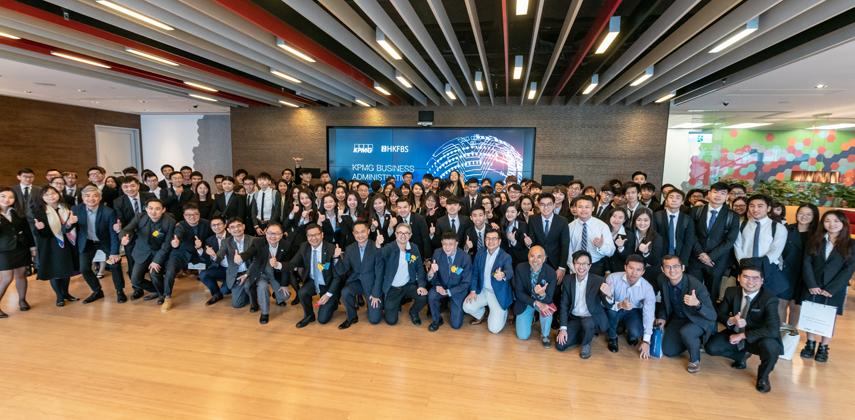By challenging students to “Build a Smart City,” with new technologies to connect and integrate the systems and services of the city, KPMG Business Administration Paper 2018 brought forth people-centred and technological solutions to improve city management and residents’ quality of life whilst reducing the environmental footprint.
Aiming at provoking and inspiring new thinking among local business undergraduates, the Hong Kong Federation of Business Students (HKFBS) is the organisation that includes the widest spectrum of local students from the business field and the organiser of the annual KPMG Business Administration Paper.
This year marks the 33rd year of the competition, regarded as one of the leading business case competitions in Asia.
Over 700 students in nearly 200 teams took part in the competition. After rounds of evaluation, four local teams and a foreign team from the National University of Singapore competed for the championship at the Grand Final of KPMG BA Paper 2018 on February 23 at KPMG’s offices. Winners stood to win cash prizes of up to HK$15,000, as well as internship opportunities at KPMG.
The finalists were each given eight minutes to pitch their business idea to the panel of judges, which comprised 19 business executives and professors. The judging panel then interrogated them on the feasibility, effectiveness and profitability of the proposed business strategy in a 15-minute Q&A session.
After the deliberations of our judging panel, “SMARTer” was crowned champion of KPMG BA Paper 2018. The SMARTer app helps property management companies control energy consumption levels to create a better and smarter society.
The team of two, Kwong Tsz Hin and Li Pui Yan, hopes to cultivate in citizens the habit of being environmentally friendly and to tackle the problem of overconsumption with the SMARTer app by measuring the energy consumption levels, water consumption levels and waste disposal volumes of both companies and households.
“What we learned from the competition is way more valuable than the prize we received. How to brainstorm ideas, how to prepare for the Q&A session, and how to pitch and to persuade judges are all things we learned from the competition. Such an experience not only broadens our horizons but also expands our network by connecting us with other teams,” Kwong and Li said.
An auto-pilot system leveraging big data analysis to minimise road accidents called “SenSafe” grabbed the first runner-up spot for Chung Yuen Yu, Leung Sin Huen, Cheung Shu Ting and Chan Pak Hin.
“This four-month journey was indeed a fruitful and memorable one. Never did we expect to get this far, but with the training workshops organised by HKFBS and advice given by mentors, we made it to the last stage. Thanks to these plentiful learning opportunities we gained insights into what a smart city is and managed to come up with a business model.”
“Project E-den,” from the team from the National University of Singapore, took the second runner-up spot. The team’s main product, Garden of E-den, both promotes environmental sustainability and aids governments in urban planning. The project also encompasses the E-den mobile application, which is a virtual platform that incentivises green activities in the community.
“We sought ways to make our presentation and our data stand out from our competitors, putting faith in our main goal — to be sustainable as a business and for the environment. We are so thankful to have had the opportunity, as Year Ones, to fly all the way to Hong Kong and to have met such a wonderful family and had such an amazing time.”
“BA Paper is a platform for undergraduates to showcase their talents and potential and improve their competencies that will help them better prepare for their future careers. It is a pleasure to witness students grow and shine through exchanging ideas with business professionals and learning from the inspiring ideas of their peers,” said Catherine Lee and Cynthia Li, project directors of KPMG BA Paper 2018.
“BA Paper is more than just a case competition. We encourage participants to think outside the box and solve contemporary problems by leveraging new technologies. The competition focuses on the idea formation and originality of their start-up models,” they concluded.


